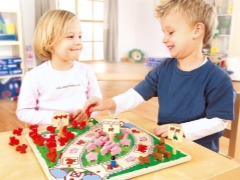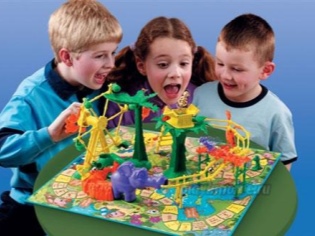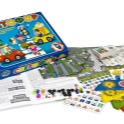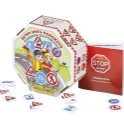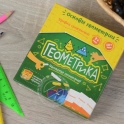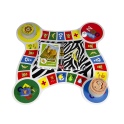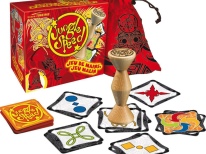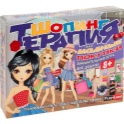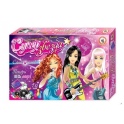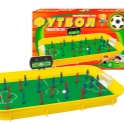The most popular board games for children 7 years old
7 years is the age when a child first begins to get used to the fact that his leisure can be independent, without constant supervision from adults. This is due to the increased level of knowledge and responsibility of the baby, but it’s not a fact that the sudden freedom that has fallen on its head will be used correctly - many children are overly fond of computers and television, but not in the useful part, but purely in the entertainment.
Board games can be an excellent alternative to harmful or useless entertainment, providing your child with a good mood, constant close social circle and an opportunity for mental development.
Benefit
Board games in any case should not be taken solely as fun, because for young children they all contain a valuable teaching element. In fact, there is no harm from them, if only they do not literally interfere with the preparation of homework, but there is plenty of benefit from them. Judge for yourself:
- Modern gadgets and television can be used with great success, including for training.But children usually do not set such a goal. Content that interests them often does not have any pedagogical benefit, and it’s good if it is not frankly amoral, as it has been popular in recent years. At the same time, kids often like just that - they do not know how to distinguish good from bad, so they are happy to spend time on, in fact, self-destruction. We had time to significantly criticize modern technologies, but did not even mention another possible disaster - all these entertainments negatively affect the vision.
In short, it is necessary to wean the child from such a pastime, but the ordinary policy of restricting entertainment will cause only a strong negative reaction and conflict in the family.
The only way to achieve the desired - to offer a decent alternative, and it is a board game with an exciting plot is able to play this role.
- For many adults, board games seem like a trivial waste of time. only because for us many of them are too simple, and all the skills that they are able to give us, we have long received. Children are another matter, because they do not yet have the experience that we have. The only type of games in which you can win, regardless of your own qualities - these are typical “Adventures”, where players move chips across the field, simply by throwing a game die. Any other types of board games require a potential winner of certain qualities - intelligence, erudition, logic, dexterity, quick response, or even strategic thinking, not to mention trifles like the ability to count in mind and plan.
Even if the baby does not yet possess the necessary qualities, he can develop them by watching other players, and then fix them during the game, because you want to gain revenge so much!
- Board games have a beneficial effect on the microclimate in almost any team, starting with the family. Tired parents, coming in the evening from work, want, first of all, rest, while children want a little attention; There are often not so many common topics that are interesting to everyone without exception. A great way to spend time together in the mode of an interesting holiday is family-style board games.Such entertainment also has a positive effect on the atmosphere at school - they, for example, can rally and better acquaint classmates, increasing the number of positive emotions from hanging out with those people who still cannot get away from.
Many board games can turn any birthday party from just a typical holiday into a truly unforgettable day.
Varieties
The concept of board games for children of 7-9 years is too wide to quickly orient themselves in it, so we will try to divide it into groups, each of which will offer the best interesting examples. So:
- Educational. Such games are very good because they give the child some new knowledge about the world, perhaps explaining to him how this or that phenomenon works and so on, which is why this type is very actively used in schools in extracurricular activities as an addition to classical education. Most often, these games are built on the principle of quizzes, where the child learns new concepts either from the answers of other players or from clues when he cannot cope with the task. A good example of such a game can make a "Journey to Europe" - a quiz devoted to the countries of this continent.
- Educational. Who said that children's games are not able to prepare kids for adulthood? Naturally, this should not happen as rudely as it happens in reality, but if the player’s task is to transform into an adult in a certain situation, then this will bring up certain skills and abilities that will be useful in life.
A good example of such a game for younger schoolchildren will be “My Zoo”, which is often called the simplified analogue of the famous “Monopoly”, which also received a very attractive entourage in the eyes of children.
- Developing agility, reaction speed, coordination, and so on. Such games are designed for large companies, and, of course, from the outside they look like ordinary fun entertainment, but you must agree - these features will be useful not only for the child, but also for the adult. There are also varieties that allow a small number of simultaneously playing players. The meaning of these games - in the set of points in a situation where certain relevant conditions are added. Globally, the popular game Wild Jungle can be a vivid example of such a game.
Review the game "Wild Jungle", see the video below.
Finally, the games are also divided by who they are intended for: for boys, some games, and for girls - completely different. The essence of them may be similar, but the entourage is somewhat different, because the boys are closer to the topic of superheroes and wars, and girls are princesses. However, most board games do not have a specific binding to the players' floor.
Rating of the most popular games
We tried to pick up several popular games that are understandable for children aged 7 years. We will not say unequivocally that they are the best, because at that age the child probably already has his own preferences, he may not appreciate the popular toy, or he may uncontrollably get carried away with something little known.
Here are some examples of games that you definitely need to pay attention to:
- Crocodile. Our grandparents also played this game, only then it was not a board game! The meaning is in explaining to others around the conceived word, phrase or even a proverb, without naming the answer, so that it is guessed - then the guesser will replace the showing and so on ad infinitum. The boxed version is good because it contains about a thousand task cards, and they are by no means limited to children's imagination, although the creators have tried their best to make all the words understandable for children 7 years old.
- Concept This game is somewhat similar to the previous one, but only by a general concept - there, too, will have to convey to other players the meaning of the conceived concept.The radical difference is that now you can neither speak nor even show gestures - the explanation is performed with step-by-step hints to which category the answer belongs. The hints themselves, again, are meaningful, but completely neutral - showing just putting chips on the playing field in front of a specific category, and the rest should understand that this is, for example, an edible animal in water (fish).
- Catashes. Unusual game for children from 5 years, the meaning of which is to collect cards with cats of the same color, and then drop them and collect points. The game is extremely simple to understand, but at the same time, like most card games, it is also interesting for adult players in its own way, so this is a great solution for the whole family.
- Children's positivium. This is another game to explain the words, but now everything is not limited to banal scoring, because thanks to correctly shown words, players or teams move their chips forward along the playing field, moving towards the finish. As on any other playing field for “walkers”, you can get both bonuses in the form of additional movement forward, and run into trouble after hitting a cell that automatically returns the player’s chip a few moves back. It is necessary not just to explain the words correctly, but also to invent a strategy of movement, choosing between simple tasks that give few moves and difficult tasks, but promising fast movement.
Tips for choosing
Board games are very popular, children are usually happy with them, but it also happens that the game is not at all able to interest the child or interests him for a relatively short time, and then goes into oblivion.
To avoid such troubles, you need to carefully approach the choice of a particular game.
To do this, give yourself the answer to a few simple questions:
- Is this game suitable for children of this age group? It should be understood that there are quite naive games for preschoolers, and they will not interest a child of 7-9 years. If the game is designed for older age, then its beauty will interest the child, but excessive complexity of the rules will quickly kill interest.
- Does the child fit his age group? It is not always necessary to choose the game, focusing only on the age that is written on the box, and the passport data of the baby. Some children develop beyond their years quickly, and they are no longer interested in what all their peers are delighted with. It happens and vice versa that the kids are a little behind.
- Is the game close to what the child likes? It is very desirable that the plot touched any hobbies of the kid, in particular, do not give calm games to active games and vice versa. However, the most popular options are versatile enough to please everyone.
- Who will the baby play with? Imagine the genuine chagrin of a child if he was presented with a wonderful game, and there is no one to play it with. This is especially true in situations where the plot requires a large number of participants, so choose carefully.
Reviews
The overwhelming majority of parents like the reaction of children to such a gift, many write that they themselves enjoyed playing with the kids. There is a large variety of game scenes, allowing you to choose something interesting for virtually every child. Criticism is relatively rare, and almost always it is caused only by the low quality of the implementation of the game - in particular, short-lived components.
